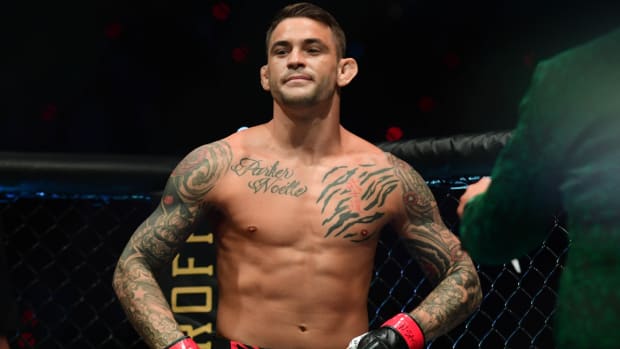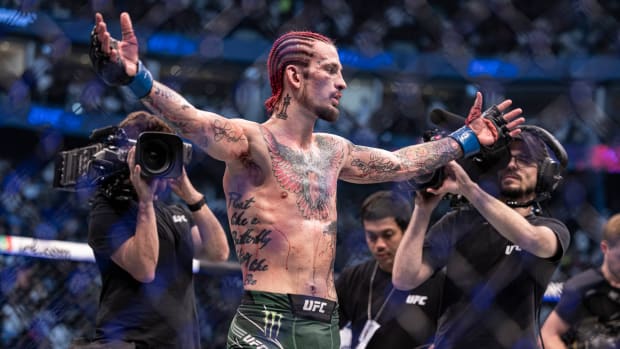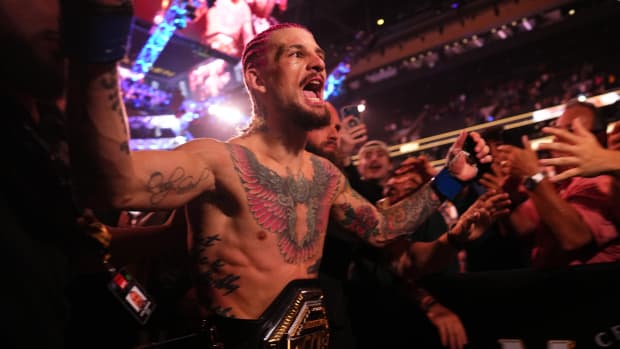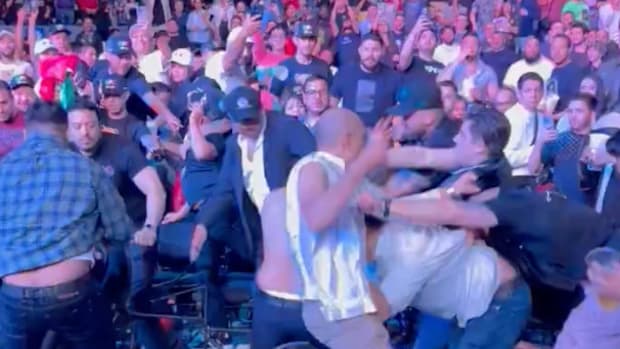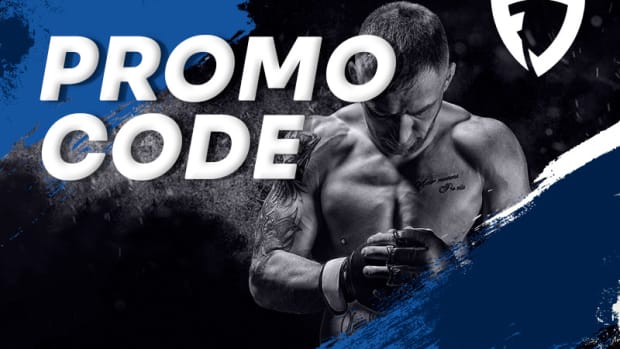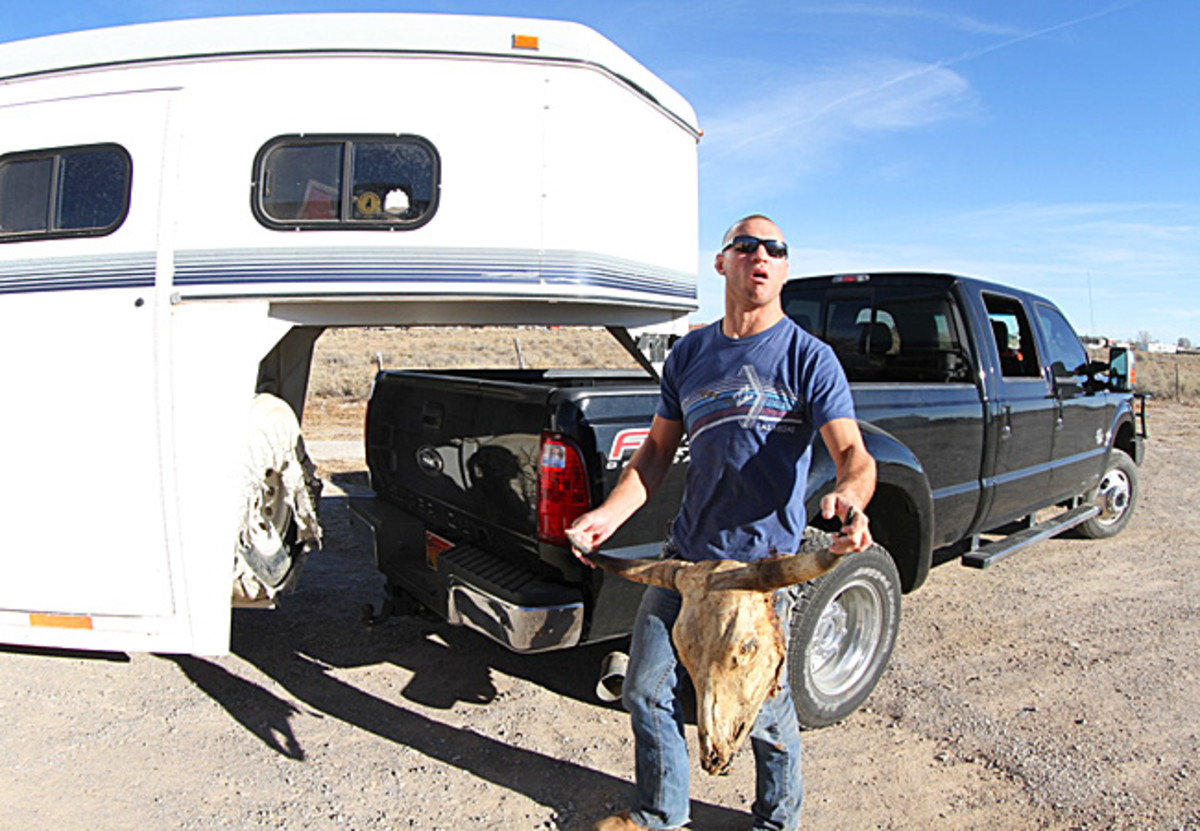
A troubled youth, "Cowboy" Cerrone becomes leader of fighters
EDGEWOOD, N.M. -- On a windswept plain just east of Albuquerque's Sandia mountain range, the ground is frozen solid, a mix of frost and snow gleaming in the early morning light, speckling the western shrubs in the dirt. The faint whiff of horse manure passes through the air. The only sounds outside are of horses stepping on the hay in their stables and of the throaty grunting of the pregnant pigs trotting through their pen. But inside the main house that sits on the 40-acre swath of land Donald "Cowboy" Cerrone efficiently calls Fight Ranch, it's an entirely different scene.
"Is Leonard still sleeping?" yells Cerrone from the kitchen down the hall to fighters climbing up the stairs from their bunks on the bottom floor of the house and filing past the bedroom door of Cerrone's best friend and fellow UFC fighter, Leonard Garcia. Cerrone is dressed, with keys in hand, ready to go -- the sound of the geese outside his window having woken him up hours earlier. The kitchen is in transition, with planks of the wooden floorboard Cerrone and the fighters he keeps as boarders at the ranch have been installing, scattered around. Above the sink stacked with dishes hangs a decorative sign reading, "A man is not born a cowboy, he becomes one."
"It's 9:15 already," he barks, waving his arm like a traffic cop towards to the truck and car waiting outside to transport the fighters to a morning workout at the renowned Jackson/Winklejohn's MMA 25 miles west in central Albuquerque. As the last straggler runs, dragging a pair of sweat pants, toward Cerrone's black dually Ford-350 truck and shuts the rear cab door, it's not lost on anyone that Cerrone, who once so vigorously bucked authority, has, in some respects, become one to the fighters he mentors under his roof.
*
Hardly anyone calls Cerrone by his given name. When he's introduced Saturday night for his lightweight contender bout against Anthony Pettis, his fans will mostly likely call him "Cowboy". His friends and teammates call him "abrasive" and "raw" when being polite. And opponents and enemies usually call him an alternate word for a type of animal Cerrone doesn't keep on his ranch -- a donkey. But few call him by his birth name --Donald Cerrone -- because that name was already taken by the man who's mere mention can bring the always brash and sometimes boorish fighter to tears.
Roughly 440 miles north of Cerrone's ranch, in Broomfield, Colo., Cowboy's grandmother, Jerry Cerrone, keeps her late husband's nameplate on her bedroom dresser: Dr. Donald Cerrone. It once sat on the desk at his busy family practice in suburban Denver. That Dr. Cerrone practiced medicine at all was nothing short of a miracle after he suffered a stroke at age 23, caused by chemotherapy for his Hodgkin's lymphoma. The stroke temporarily rendered him unable to read and permanently crippled his right arm and left him dragging his leg. But Dr. Cerrone -- with the help of his beloved Jerry who re-taught him how to read starting with children's books -- stuffed himself into cowboy boots that helped straighten his gait, and hobbled off to treat the scores of families who relied on him.
It was at that office where the Cerrones would sometimes babysit their grandson, Lil' Donald, who often ran, talked and tore his way out of almost every daycare his parents could find. Doctors diagnosed Lil' Donald with an attention deficit disorder but Dr. Cerrone discarded the notion and the bottle of pills that accompanied it, calling it a "wastepaper basket disease".
"My husband said whenever a kid is real intelligent and has an interest in life, and is wild and runs around and does a bunch of things, they want to give him a pill to make him quite," says Jerry. "He wasn't quiet. He was just Cowboy."
One night, the police awoke the Cerrones with a phone call that their office had been broken into and ransacked. The officer started telling Jerry that no drugs appeared to have been stolen when she interrupt the officer. "Are there discared X-rays films all over?" she asked. "And are there tons of tongue depressors all over?" The officer said yes.
"It wasn't broken into," she told the police, "We just had our four-year-old grandson with us that day and he destroyed our office."
That late-night alleged robbery would be the first in a long string of police encounters for the Cerrones and their grandson. Not long after Lil' Donald -- though not so little anymore -- entered high school, his parents divorced. With neither parent in a position to take care of their son whose behavior ranged from rambunctious to unlawful, Lil' Donald moved into his grandparents home.
"He was better with us," says Jerry, "but he was still a handful."
Lil' Donald's respect for his grandfather, who willed his way to a fulfilling career, combined with his grandparents' judiciousness in how they approached their grandson helped temper his behavior.
Junk piled all over his room? Grandma ignored it.
The tasteless poster he hung from his walls? Jerry chose to shut the door.
"We picked out battles," she says. "I told him I was on his side whatever he did. If some of the things he did were to test me and grandpa, then he was wasting his time because we would always pass each and every test he gave us. We would never throw him aside."
The toughest -- and most expensive -- tests for the Cerrones frequently came in the dead of night when the phone would ring. The calls came from jails in nearby Greeley and Fort Collins, Brighton and Golden, Boulder and Denver. The Cerrones showed up with bail money.
"I didn't know they didn't take checks," Jerry says of their first bailout attempt. "That's when I realized you had to take cash."
Cowboy knew his grandparents always showed up with a ride, cash and some of the wisdom grandpa doled out in spades. No matter the hour or the issue, his grandparents embodied the ethos of Shel Silverstein's children's book The Giving Tree, that grandma loved so much. Yet their unconditional love provided stability but still no direction for their grandson as adulthood approached. He flitted from attempts at construction jobs to a career as a professional bull rider. But where he really excelled was in the back-alley bars, were his acerbic personality, boots and hat provided ample opportunities for him to ply his talents as a fighter.
At age 20, Cowboy followed a friend to a Colorado kickboxing dojo and he immediately excelled. Lil' Donald proved to be as athletic as Dr. Cerrone was cerebral. He competed in kickboxing tournaments around the globe and picked up muay thai along the way. In the summer of 2006, a Colorado fight promoter offered Cowboy $5,000 to fight mixed martial arts in a Ring of Fire event. Cowboy didn't hesitate.
Neither did his grandfather. "He was thrilled that he'd found a path," says Jerry. "I don't worry about him at all in the cage because he has guys there to protect him. He was beat up so bad by the Denver police. I picked him up about five one morning. They had handcuffed him and kicked him. It was the worst beating he ever had. ...Whenever there's a tough opponent coming, I think, well, at least there's not two of them and at least they're not going to handcuff him."
Plus, grandma says in plainspoken philosophy, "Everybody takes hits in life." His grandfather reiterated the advice he often gave Cowboy by quoting Abraham Lincoln, "Whatever you are, be a good one."
Cowboy instantly demonstrated the capacity to be among the best. He tore through the Ring of Fire circuit, winning his first four bouts with first-round submissions. He earned the equivalent of a promotion when the World Extreme Cagefighting circuit offered him a contract. His grandparents travelled wherever, whenever they could to be cageside at his fights.
By late 2006, Cowboy packed up his pickup and moved to New Mexico to train with leading MMA coach Greg Jackson. He and fellow fighter Leonard Garcia moved to Albuquerque, renting various homes in the state's biggest city. But none of it felt right to Cowboy, who dreamed of open landscapes, or to Garcia, who grew up on Texas ranches. In 2009, Cowboy began scouring the real estate listings until stumbling upon an advertisement for a 40-acre ranch just east of Albuquerque. But loan officers generally don't look favorably on loan applications that list "cagefighter" as the applicant's primary occupation. Cowboy was stuck. But he did what he'd learned he could always do: He called his grandfather.
When Cowboy brought his grandfather to see the ranch he'd fallen for, he was seeking advice more than financing. The woman who owned the land showcased the property for the two Donalds and when the tour ended, Dr. Cerrone told the owner, "Well, it's not really what were looking for."
Cowboy, unaccustomed to the nuances of negotiations, blurted out, "It's exactly what we're looking for."
Unbeknownst to Cowboy, his grandfather had already gone to the bank and secured the money he'd need to buy the land. Dr. Cerrone believed in Cowboy, relishing how the boy who once didn't know who he was seemed to now know exactly what he wanted: a successful career in MMA. Dr. Cerrone vowed to do anything and everything to help his grandson live up to Lincoln's words.
But as Cowboy fought inside of cages, the Cerrones staged their own battles against a far more frightening opponent: Dr. Cerrone's declining health. The doctor had already outlived the six-month prognosis he'd been given 50 years earlier. The cancer that had been lurking in his body no longer remained dormant in his lymph nodes. Not long after purchasing the ranch, Dr. Cerrone's already fragile health continued to crack.
"I'm not going to die until you're in the UFC," Dr. Cerrone told Cowboy.
But as the holiday season passed, and the year 2010 slipped into 2011, so too did Dr. Cerrone's health. Jerry, a lifelong nurse, had to place him in hospice. Not long after he entered hospice care, Dr. Cerrone asked to speak with Cowboy alone.
"I don't know how much longer I can hang on so try to get into the UFC," Dr. Cerrone told his grandson.
The sound of Cowboy's cellphone ringing interrupted the solemnity of the moment. Cowboy checked the number. It was the UFC, asking Cowboy if he'd take a short-notice fight against Paul Kelly. Cowboy looked at his dying grandfather, knowing time was short, and started to say no.
Dr. Cerrone, with the little energy remaining in his body, interrupted Cowboy's call.
"Have you not been listening," he asked his grandson. "I'm ready to die but I can't until you're in the UFC!"
*
On Feb. 5, 2011, Cowboy Cerrone reached the pinnacle of professional success. As he walked towards the cage for warm-ups ahead of his UFC fight, he saw Garcia on the phone. "I see Leonard on the phone," Cowboy says, "and I just saw his face and knew."
Jerry was on the other end of the call, telling Garcia that Dr. Cerrone's that life was quickly seeping from her husband. A coma had set in. But the medically-trained Jerry knew that a person's hearing is the last sense to go and she asked Leonard to place the phone in the air, so she could put her phone next to Dr. Cerrone's ear and allow him to hear the fight. When it ended, Dr. Donald Cerrone died.
"Can you believe a man would hang on for that," Jerry says through tears. "Cowboy definitely kept him alive for two years. . ...Cowboy was the light of his life."
*
If Cowboy was the light of his Dr. Cerrone's life, then Dr. Cerrone was the moral center of his. He honors his grandfather by having converted the ranch into a training mecca for up-and-coming fighters. For $500 per month, young fighters may board in one of the 10 bunk beds lining the bottom floor of the main house. It also covers training costs and gym fees, utilities, plus transportation to and from Jackson/Winkeljohn's. The likes of Diego Brandao and Erik "Goyito" Perez have all lived at the ranch.
"We figured we could make a lot of money," says Garcia, Cowboy's business partner in the fight ranch. "But we're notorious for keeping people who can't afford to pay. They have no where else to go."
In the process, Cowboy learned an even greater value than money. "It give me some sense of worth," Cowboy says of Fight Ranch. "I know what needs to be done to cut weight, how to deal with sponsorships, etc. This is a good opportunity to give back."
Cowboy has assumed the role as unlikely mentor but rejects that of unwilling babysitter. "We don't have fans who live here. You have to be motivated. You have to be ready to better yourself."
He doesn't so much preach that concept as he embodies it.
Not long after the sun has set behind the Sandia mountains, Cowboy has assembled a group of fighters in a small gym he built just steps away from the main house. Heavy bags hang from a bag rack he and Garcia welded out of horseshoes. Cardio equipment rings the room and a cage occupies one corner. Cowboy is in the center of the space, leading a wrestling workout.
"Wrestling will dictate this fight," he says of his upcoming match with Pettis. "I'm really working on my wrestling, on my top game, on my jujitsu."
Before Dr. Cerrone died, a man on the street once saw him wearing a pair of cowboy boots made from the now-endangered sea turtles. The man offered him $5,000 on the spot for the boots. Dr. Cerrone rejected the man's offer. "These are for my grandson," he told him. And it's years later, watching Cerrone leading that sundown practice, that it becomes apparent that Cowboy might now just be man enough to fill them.

